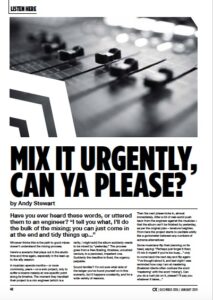News
5 Feb 2019
Mix It Urgently, Can Ya Please?

Subscribe to CX E-News
LISTEN HERE
Mix It Urgently, Can Ya Please?
by Andy Stewart.
Have you ever heard these words, or uttered them to an engineer? “I tell you what, I’ll do the bulk of the mixing; you can just come in at the end and tidy things up…”
Whoever thinks this is the path to good mixes doesn’t understand the mixing process.
Here’s a scenario that plays out in the studio time and time again, especially in the lead-up to the silly season: A musician spends months – or more commonly, years – on a solo project, only to suffer a bizarre malady at one specific point along its timeline.
The moment they handball their project to a mix engineer (which is a rarity, I might add) the album suddenly needs to be mixed by “yesterday.” The process goes from a free-floating, timeless, unrushed venture, to a panicked, impatient one. Suddenly the deadline is fixed, the urgency palpable.
Sound familiar? I’m not sure what side of the ledger you’ve found yourself on in this scenario, but it happens constantly, and for a wide variety of reasons.
Then the next phase kicks in, almost immediately. After a bit of real-world push back from the engineer against the musician – that the album can’t be finished by yesterday, as per the original plan – tensions heighten.
From here the project starts to oscillate wildly like a goniometer between any numbers of extreme alternatives:
Some musicians flip their planning on its head, saying: “Perhaps just forget it then; I’ll mix it myself if you’re too busy…” only to come back the next day and flip again: I’ve thought about it, and last night I was reminded how crap I am at mastering (flustered clients often confuse the word ‘mastering’ with the word ‘mixing’). Can you do a rush job on it, please? I’ll pay you whatever it takes…”
The day after that a new insanity (disguised as sanity) prevails:“How about I mix it at home and you just spend a day tidying things up at the end?”
My response: “Umm, are we talking about mixing here, or mastering?” I can never resist the dig.
All Aboard!
There’s no underestimating, or denying, the amount of effort it takes to push a solo project over the line. It’s no mean feat, and I’m full of admiration for anyone who can pull it off, especially if they’ve got a partner and kids.
The downside of all this unpaid work, however, is that it grows exhausting after a while. Moreover, the personal circumstances musicians find themselves in at the start of a solo project are not usually the ones they inhabit at the end.
Single musos with oodles of time on their hands for late-night overdubbing at the beginning of a solo project often later find themselves with a new job (how inconvenient), or partners that move in and don’t take kindly to mic’d amps in the kitchen or 24-channel mic looms across the hallway (how intolerant).
Things change, especially if you wait long enough. Regardless, no-one has the capacity to push something down the road forever. Eventually you have to call the RAC.
It should come as no surprise then that when a solo artist eventually hands over their substantial body of work to a mix engineer, they feel such relief that they mistakenly think the job is, in effect, done.
But it’s not! Not by a long shot in many circumstances, particularly if the music has endured countless recording processes, overdubs, edits and partial re-incarnations. Ironically, often it’s the recording process that’s the easy bit!
Out of this chemical cocktail of bottled up tension the panic around time distils. The desperate need to wrap things up has often been held at bay by the artist for years:
hidden by self-denial, dodged like Tyson, and resisted at every turn. But now it’s unleashed, and if you’re in the way, look out! Without realising it, you, the newly designated mix engineer, could unwittingly be hitching a ride on a runaway train, and if it derails, one inalienable fact will remain: it’s always the last one on board who gets the blame for the disaster!
So it’s during this handover period that all parties need to be sensitive to the emotionally charged nature of a solo project. So much has been invested thus far into the work – an album of songs that has behaved more like a super-massive black hole at times than a 12-inch disc – that it’s easy to find a scapegoat the moment temperatures rise. And they always do, because once the handover takes place, the drugs wear off.
Switching Tracks
It pays to have a plan at this juncture, and stick to it like glue.
Don’t second guess everything, or go around in circles yet again. The time for that has passed… was it last year (or last decade)? And don’t, whatever you do, start to second-guess the need for an engineer in the first place just because they didn’t jump straight into your project the following day.
More than anything else, however, don’t get hung up on some unrealistic deadline. It doesn’t help anyone to be pushing for an arbitrary finish date – especially when everyone knows there hasn’t been one for the rest of the entire project’s life.
The irony won’t be lost on the engineer, and they won’t find it amusing, only annoying, or possibly infuriating. Once the engineer has the project in their capable hands, patience is a must.
If you’re the musician, don’t ring the engineer every day for a progress report when you know they have 10 other projects on, or at 6AM because you’ve been up all night worrying about how things are going.
Don’t tell them things like: “It feels like things are taking ages! Should I just be mixing it myself?”
If you’re going to be like that, the short answer is, yes.
Similarly, if you’re the engineer, don’t leave it for three weeks before you get back to the solo artist with said progress report, or you might find yourself in a screaming match before three words are uttered.
Be sensitive to the fact that they’re champing at the bit, and desperate – though it’s arguably unjustified – to wrap things up. Don’t let their stress levels around the timeline freak you out too much, and if necessary, explain the process in a bit more detail than you otherwise might, so they have something to keep them company late at night while they’re freaking out.
There’s no easy way through such an emotionally charged project other than via the same mixing route you always take. If you rush it, or buy into the panic, you might find yourself working 24/7 only to the detriment of your own health and the sanity of those around you.
And later – and believe me this happens – there remains the very real prospect that the artist will, at the end of the project, simply shrug their shoulders and say…
“I’ve actually decided to hold off on the release ’til next year because a mate of mine is getting married in Bali in December, and he wants me to be the best man!”
At this point every engineer would be well within their rights to utter two expletives very loudly to their client! [Insert your own here!]
Deadlines are mostly security blankets, held by musical infants or hangers-on desperate to see their own pay cheques rolling in. If the album project you’re committing to is not a commercial release by a significant solo artist with the backing of a large record label, chances are the album is coming out after the mate’s wedding.
Andy Stewart owns and operates The Mill on Victoria’s Bass Coast. He’s a highly credentialed producer/engineer who’s seen it all in studios for over three decades. He’s happy to respond to any pleas for recording or mixing help… contact him at: andy@themill.net.au
From the December 2018 – January 2019 edition of CX Magazine. CX Magazine is Australia and New Zealand’s only publication dedicated to entertainment technology news and issues – available in print and online. Read all editions for free or search our archive www.cxnetwork.com.au
© CX Media
Subscribe
Published monthly since 1991, our famous AV industry magazine is free for download or pay for print. Subscribers also receive CX News, our free weekly email with the latest industry news and jobs.







